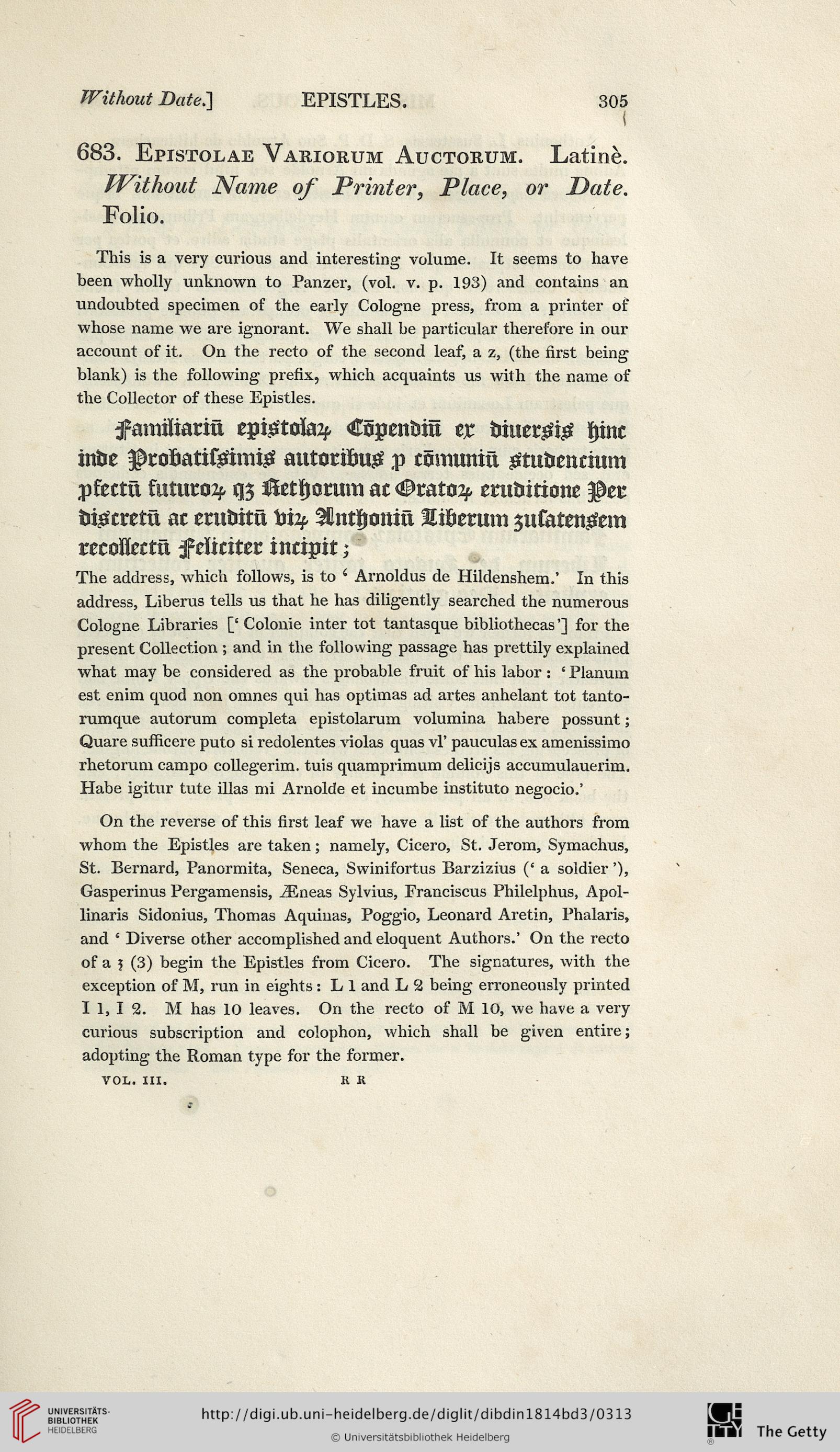Without Date>~]
EPISTLES.
305
683. Epistolae Variorum Auctorum. Latine.
TVithout Ncime of Printer, Place, or T>ate.
Folio.
This is a very curious and interesting volume. It seems to have
been wholly unknown to Panzer, (voh v. p. 193) and contains an
undoubted specimen of the early Cologne press, from a printer of
whose name we are ignorant. We shall be particular therefore in our
account of it. On the recto of the second leaf, a z, (the sirst being
blank) is the following prefix, which acquaints us with the name of
the Collector of these Epistles.
f amiliam cpistola^ €5gentsra cr &iucr£i£ ijinc
intic $tofmtissimiS mitonlms p comuniu gtu&cncium
pfcctu fiituro2f ilctijorum ac €>ratoif crutiitionc ^cr
tiiocrctu ac crutiitu i)i2f 2tntfjouiu lii&crum $usatcnOcm
rccoHcctst s elicitcr incipit;
The address, which follows, is to 4 Arnoldus de Hildenshem.’ In this
address, Liberus tells us that he has diligently searched the numerous
Cologne Libraries [‘ Colonie inter tot tantasque bibliothecas ’] for the
present Collection ; and in the follovving passage has prettily explained
what may be considered as the probable fruit of his labor : £ Planum
est enim quod non omnes qui has optimas ad artes anhelant tot tanto-
rumque autorum completa epistolarum volumina habere possunt;
Quare sufficere puto si redolentes violas quas vl’ pauculas ex amenissimo
rhetoi’um campo collegerim. tuis quamprimum delieijs accumulauerim.
Habe igitur tute illas mi Arnolde et incumbe instituto negocio.’
On the reverse of this first leaf we have a list of the authors from
whom the Epistles are taken; namely, Cicero, St. Jerom, Symachus,
St. Bernard, Panormita, Seneca, Swinifortus Barzizius (‘ a soldier ’),
Gasperinus Pergamensis, iEneas Sylvius, Pranciscus Philelphus, Apol-
linaris Sidonius, Thomas Aquinas, Poggio, Leonard Aretin, Phalai’is,
and * Diverse other accomplished and eloquent Authors.’ On the recto
of a ? (3) begin the Epistles from Cicero. The signatures, with the
exception of M, run in eights : L 1 and L 2 being eri’oneously printed
I 1, I 2. M has 10 leaves. On the recto of M 10, we have a very
curious subscription and colophon, which shall be given entire;
adopting the Roman type for the former.
VOL. III.
u K
EPISTLES.
305
683. Epistolae Variorum Auctorum. Latine.
TVithout Ncime of Printer, Place, or T>ate.
Folio.
This is a very curious and interesting volume. It seems to have
been wholly unknown to Panzer, (voh v. p. 193) and contains an
undoubted specimen of the early Cologne press, from a printer of
whose name we are ignorant. We shall be particular therefore in our
account of it. On the recto of the second leaf, a z, (the sirst being
blank) is the following prefix, which acquaints us with the name of
the Collector of these Epistles.
f amiliam cpistola^ €5gentsra cr &iucr£i£ ijinc
intic $tofmtissimiS mitonlms p comuniu gtu&cncium
pfcctu fiituro2f ilctijorum ac €>ratoif crutiitionc ^cr
tiiocrctu ac crutiitu i)i2f 2tntfjouiu lii&crum $usatcnOcm
rccoHcctst s elicitcr incipit;
The address, which follows, is to 4 Arnoldus de Hildenshem.’ In this
address, Liberus tells us that he has diligently searched the numerous
Cologne Libraries [‘ Colonie inter tot tantasque bibliothecas ’] for the
present Collection ; and in the follovving passage has prettily explained
what may be considered as the probable fruit of his labor : £ Planum
est enim quod non omnes qui has optimas ad artes anhelant tot tanto-
rumque autorum completa epistolarum volumina habere possunt;
Quare sufficere puto si redolentes violas quas vl’ pauculas ex amenissimo
rhetoi’um campo collegerim. tuis quamprimum delieijs accumulauerim.
Habe igitur tute illas mi Arnolde et incumbe instituto negocio.’
On the reverse of this first leaf we have a list of the authors from
whom the Epistles are taken; namely, Cicero, St. Jerom, Symachus,
St. Bernard, Panormita, Seneca, Swinifortus Barzizius (‘ a soldier ’),
Gasperinus Pergamensis, iEneas Sylvius, Pranciscus Philelphus, Apol-
linaris Sidonius, Thomas Aquinas, Poggio, Leonard Aretin, Phalai’is,
and * Diverse other accomplished and eloquent Authors.’ On the recto
of a ? (3) begin the Epistles from Cicero. The signatures, with the
exception of M, run in eights : L 1 and L 2 being eri’oneously printed
I 1, I 2. M has 10 leaves. On the recto of M 10, we have a very
curious subscription and colophon, which shall be given entire;
adopting the Roman type for the former.
VOL. III.
u K




